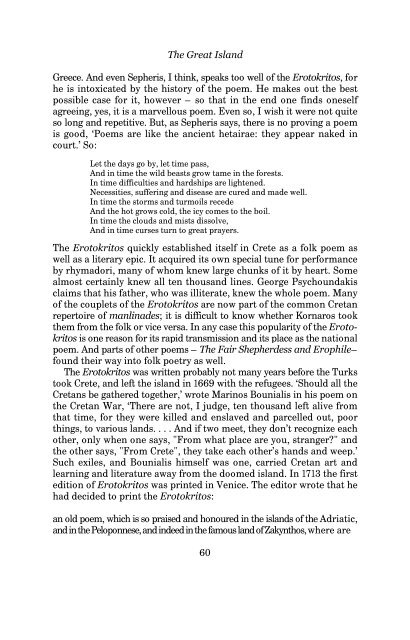free download here - Michael Llewellyn-Smith
free download here - Michael Llewellyn-Smith
free download here - Michael Llewellyn-Smith
Create successful ePaper yourself
Turn your PDF publications into a flip-book with our unique Google optimized e-Paper software.
The Great Island<br />
Greece. And even Sepheris, I think, speaks too well of the Erotokritos, for<br />
he is intoxicated by the history of the poem. He makes out the best<br />
possible case for it, however – so that in the end one finds oneself<br />
agreeing, yes, it is a marvellous poem. Even so, I wish it were not quite<br />
so long and repetitive. But, as Sepheris says, t<strong>here</strong> is no proving a poem<br />
is good, ‘Poems are like the ancient hetairae: they appear naked in<br />
court.’ So:<br />
Let the days go by, let time pass,<br />
And in time the wild beasts grow tame in the forests.<br />
In time difficulties and hardships are lightened.<br />
Necessities, suffering and disease are cured and made well.<br />
In time the storms and turmoils recede<br />
And the hot grows cold, the icy comes to the boil.<br />
In time the clouds and mists dissolve,<br />
And in time curses turn to great prayers.<br />
The Erotokritos quickly established itself in Crete as a folk poem as<br />
well as a literary epic. It acquired its own special tune for performance<br />
by rhymadori, many of whom knew large chunks of it by heart. Some<br />
almost certainly knew all ten thousand lines. George Psychoundakis<br />
claims that his father, who was illiterate, knew the whole poem. Many<br />
of the couplets of the Erotokritos are now part of the common Cretan<br />
repertoire of manlinades; it is difficult to know whether Kornaros took<br />
them from the folk or vice versa. In any case this popularity of the Erotokritos<br />
is one reason for its rapid transmission and its place as the national<br />
poem. And parts of other poems – The Fair Shepherdess and Erophile–<br />
found their way into folk poetry as well.<br />
The Erotokritos was written probably not many years before the Turks<br />
took Crete, and left the island in 1669 with the refugees. ‘Should all the<br />
Cretans be gat<strong>here</strong>d together,’ wrote Marinos Bounialis in his poem on<br />
the Cretan War, ‘T<strong>here</strong> are not, I judge, ten thousand left alive from<br />
that time, for they were killed and enslaved and parcelled out, poor<br />
things, to various lands. . . . And if two meet, they don’t recognize each<br />
other, only when one says, "From what place are you, stranger?" and<br />
the other says, "From Crete", they take each other’s hands and weep.’<br />
Such exiles, and Bounialis himself was one, carried Cretan art and<br />
learning and literature away from the doomed island. In 1713 the first<br />
edition of Erotokritos was printed in Venice. The editor wrote that he<br />
had decided to print the Erotokritos:<br />
an old poem, which is so praised and honoured in the islands of the Adriatic,<br />
and in the Peloponnese, and indeed in the famous land of Zakynthos, w<strong>here</strong> are<br />
60


